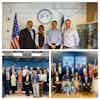 Vincent Voci
Vincent Voci
Former Vice President, Cyber Policy and Operations, U.S. Chamber of Commerce
 Josh Kram
Josh Kram
Former Vice President, International Strategy and Partnerships, U.S. Chamber of Commerce
 Danielle Muñoz
Danielle Muñoz
Former Policy and Program Manager, Center for Global Regulatory Cooperation
Published
July 12, 2023
This global conference brought together 11,000 international cybersecurity experts and policymakers, including 400 speakers representing 100 countries from the U.S., Europe, the Middle East, and Asia, for discussions about cyber policy and technology issues and to build alliances to strengthen our collective cyber defense.
Why Israel? The US-Israel cyber relationship—public and private—is a global model in that we have a common risk-based approach to regulation, strong public-private dialogue, and active bilateral R&D relationships. Around 20% of global investment into cybersecurity start-up companies goes to Israeli firms. This is a boon for U.S. companies looking for cyber solutions. Throughout our visit, we worked closely with our partners in Israel to connect our delegates with new technologies solutions and new deals were inked from this fruitful collaboration.
ENGAGEMENT WITH ISRAEL'S CYBER ECOSYSTEM
We visited Be'er Sheva, known as Israel's "cyber capital," where we toured Israel's National Cyber Emergency Response Team (CERT), cyber innovation laboratories focused on intelligent transportation systems and industrial control systems, and the IDF School of Computer Science also known as "Basmach.” We discussed opportunities to enhance collaboration with Israel’s National Cyber Directorate (INCD) in areas such as health and transportation, how we might drive a global private-private coalition to promote “security by design,” and how the Abraham Accords could promote regional cyber cooperation.

INTERNATIONAL CYBER ENGAGEMENT
The U.S. Chamber convened policy roundtables with influential cyber leaders from nearly a dozen cybersecurity agencies around the world, including the U.K., UAE, Singapore, Israel, Czech Republic, Sweden, Spain, and Canada. These discussions focused on national cyber strategies and emphasized the importance of addressing the harmful impact of digital sovereignty on cybersecurity and digital commerce. For our policy priorities, see here.

U.S.-ISRAEL COMMERCIAL POLICY PRIORITIES
The delegation and members of our US-Israel Business Council met with senior Israeli officials—including Tzachi Hanegbi, National Security Advisor, Gaby Portnoy, Director General, Israel National Cyber Directorate, and others from the Ministries of Health, Economy & Industry, and Finance—to discuss priorities trade, innovation, and investment, including ongoing private sector engagement in the upcoming U.S.-Israel Strategic High Level Dialogue on Technology.

U.S. ISRAEL DIGITAL FORUM
Hosted at Microsoft’s campus in Herzliya, the U.S. Chamber convened a forum focused on digital policy issues that included representatives from Israel’s Ministries of Economy & Industry, Justice, and Privacy Protection Authority to discuss the regulatory and legal frameworks in Israel for emerging digital technologies. Participants discussed the need to balance the opportunities for joint innovation with strong privacy and cyber protections. Israel is considering joining the Cross Border Privacy Rules (CBPR) Forum and will seek public comment when a revision of the national privacy law is released. A special thank you to the Israel Hi-Tech Association, the Israel Manufacturers Association, and AmCham Israel, for their support in organizing the program.

CYBER WEEK CONFERENCE
Members of our delegation participated in or led numerous conference programs, including Israel Healthcare Cybersecurity Summit, Cybersecurity Regulation in the Age of A.I., A.I. & Cyber, Regulating Cyber Surveillance - New Public/Private Partnership, Securing the ICT Supply Chain from Cybersecurity Threats, Embracing the Quantum Computing Revolution: Unleashing the Opportunities for Cybersecurity, CISO Roundtable, The BOMs are coming, Emerging Threats to Critical Infrastructure, and the Intelligent Transportation Systems Cybersecurity Summit. Members of the delegation benefited from the unique opportunities and collaboration that the U.S. Chamber has with Tel Aviv University to provide thought leadership and expertise on the part of their organizations to a global audience. As evidenced by the quality of the audience questions, worldwide community members are informed and influenced by the U.S. approach to cybersecurity policy regulations.

GLOBAL CYBER CABINET GALA DINNER
With special thanks to Honeywell, Quantinuum, Waterfall Security, and Microsoft, the U.S. Chamber hosted an unforgettable gala dinner, which brought together 150 attendees, including esteemed guests such as Kemba Walden, Acting National Cyber Director at the White House, Nate Fick, Ambassador-at-Large for Cyberspace and Digital Policy, and officials from Commerce, DHS, FBI, and DOE. In their keynote remarks, Director General Portnoy, Matt Bohne from Honeywell, and Andrew Ginter from Waterfall Security stressed the importance of public-private partnerships, international collaboration, and common, technical, risk-based approaches to cybersecurity policy.

About the authors

Vincent Voci
Vince Voci is the former Vice President for Cyber Policy and Operations in the Cyber, Intelligence, and Supply Chain Security Division at the U.S. Chamber of Commerce.

Josh Kram
Joshua Kram directs work on emerging trade and technology policy issues, oversees programs with senior government officials and business leaders, and heads the U.S.-Israel Business Council.

Danielle Muñoz
Danielle Muñoz is the former Policy and Program Manager or the Center for Global Regulatory Cooperation at the U.S. Chamber of Commerce.





